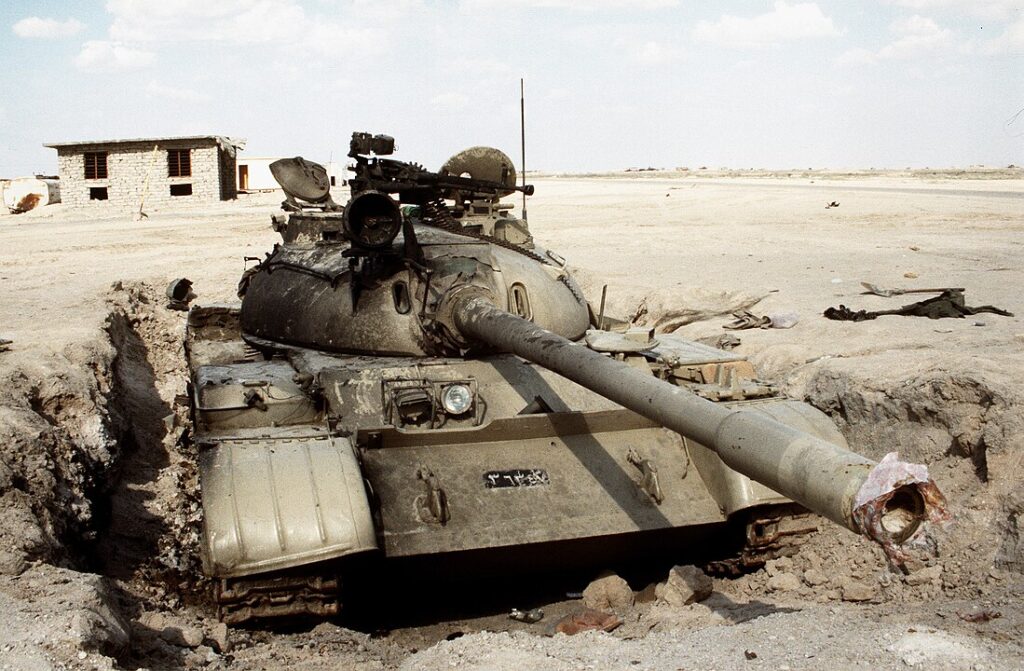The First Gulf War (1990–1991)
The Gulf War was a conflict between a coalition of the largest international troops since World War II — under the authority of the UN and led by the US, with support and permission from Arab countries in an attack code-named Operation Desert Storm — and Saddam Hussein (whose Iraqi forces occupied and annexed Kuwait) over control of Kuwait’s oil and wealth. It was the first televised American conflict.
What Led To The Gulf War
After the Iran-Iraq war (an eight-year conflict), due to the purchase of weapons of mass destruction, Iraq was in massive debt with her neighbours in the Middle East. Saddam Hussein, the Iraqi leader, wanted to increase oil production and exportation to pay off this debt, as well as secure his rule. He believed a military victory over Kuwait would reduce opposition.
The Gulf War
On August 1990, the invasion of Kuwait by Iraqi forces began with a bombing campaign. Unfortunately, because Kuwait’s forces were outnumbered (most of their military were on leave), Saddam Hussein gained control of the country within 12 hours. The good news, however, was that the ruler of Kuwait, Sheikh Jaber Al-Sadah, and most of the Kuwaiti Royal family fled to neighbouring countries.
Operation Desert Eagle
With the Iraqi army being the world’s fourth-largest military (at that time), the invasion of Kuwait was thought to be Iraq’s first step in a greater consolidatory effort to gain control over twenty percent of the world’s oil reserves, thereby becoming the world’s dominant oil power. To prevent such a reality and free Kuwait, President Bush organized an international coalition to form an operation known as Operation Desert Shield.
The End Of The Gulf War
Coalition forces attacked — first with the deployment of bombs for five weeks, then the utilization of ground forces — strategic Iraqi targets. In response, Iraq launched SCUD missiles at Israel (an unsuccessful provocation), as well as setting fire to hundreds of Kuwaiti oil wells and dumping millions worth of gallons of oil into the Persian Gulf. However, Iraq’s retaliations were for naught as, after a four-day ground campaign, much of her troops withdrew from
Kuwait.
In February 1991, a few days later, President Bush declared a ceasefire. The Gulf War was over, and Kuwait was free from Iraqi occupation.
Aftermath
Some of the cultural, social, and political consequences of the Gulf War are listed below:
● Despite the targets being key Iraqi targets, as a result of the bombing campaign, Iraqi civilians suffered significant casualties — some, an indirect consequence of the lack of
food and medical services during and after the war.
● The burning of Kuwaiti oil wells and the subsequent dumping had a pronounced effect not only on the country’s climate (and its neighbors) but also on local vegetation and wildlife.
● Although Saddam had lost the trust of most Middle Eastern nations, he was still allowed to remain in power in Iraq. To the US, the Iraqi leader was preferable to an Islamic revolution. A controversial decision that would end in the Iraq war — after Iraq refused to submit to searches for weapons of mass destruction.
Bibliography
Wharton, James. “What Caused the Gulf War?” Forces Network, 15 Jan. 2021,
https://www.forces.net/heritage/history/what-caused-gulf-war.
Kettle, Louise. “The Enduring Lessons of the 1991 Gulf War.” Ballots & Bullets | School of Politics & International Relations, University of Nottingham, 26 Jan. 2016,
https://nottspolitics.org/2016/01/26/the-enduring-lessons-of-the-gulf-war/.
“From One Student to Another – Why Did the Gulf War Only Last for 7 Months?” History,
https://www.historyfromonestudenttoanother.com/igcse-international-relations/why-did-events-in-the-gulf-matter-c-1979-2000/why-did-the-gulf-war-only-last-for-7-months.
Linden, O., et al. “The Environmental Impacts of the Gulf War 1991.” International Institute For Applied System Analysis, IIASA Interim Report, IR-04-019, 1 Apr. 2004,
https://pure.iiasa.ac.at/id/eprint/7427/.
“The Gulf War (Article) | 1990s America.” Khan Academy, Khan Academy,
https://www.khanacademy.org/humanities/us-history/modern-us/1990s-america/a/the-gulf-war.
“Chapter 7: Why Did Events in the Gulf Matter, C – 2000?.” SlidePlayer, Google,
https://www.google.com/amp/s/slideplayer.com/amp/13971130/.
“US History.” Ducksters,
https://www.ducksters.com/history/us_1900s/gulf_war.php.
Tyler, Patrick E., and Richard W. Stevenson. “The Environmental Impacts of the Gulf War 1991.” The New York Times, The New York Times, 30 July 2002,
https://www.nytimes.com/2002/07/30/world/profound-effect-on-us-economy-is-seen-from-awar-against-iraq.html.

